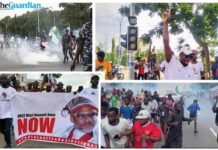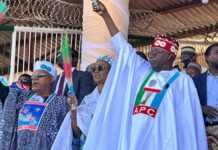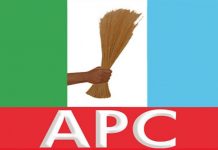Olusegun Adeniyi
For the past several years, the joke in Abuja is that whenever Nigeria encounters dire financial straits, the late General Sani Abacha looks down on us from beyond and drops a hefty sum into the national coffers. While I disagree with a friend who insists that Nigeria may have used Abacha for money rituals, more than a few were delighted last Friday when President Bola Tinubu announced that a fresh tranche of $150 million is on the way. “Thank you for the good news on the return of Abacha loot,” Tinubu told Catherine Colonna, the visiting French Minister of Europe, and Foreign Affairs, who delivered the news. “We appreciate your effective cooperation concerning the return of Nigeria’s money. It will be judiciously applied in attaining our development objectives.”
As I wrote in my book, ‘The Last 100 Days of Abacha’, the massive loot amassed by Abacha was done mostly through crooked oil deals, debt buy-back scams, and siphoning money directly from the Central Bank of Nigeria (CBN). But it says so much about us as a people that more than a quarter of a century later, no effort has been spared to interrogate why Abacha was able to take more than $4 billion from the treasury so easily. If only to learn lessons that will ensure it does not happen again. A bullion van from the apex bank delivering stacks of public money, in local and foreign currencies, to an individual, no matter how highly placed, is beyond corruption. That is what Yoruba people would call, ‘Tani o mu mi?’, which I once explained in a column as impunity writ large.
Perhaps it is also deliberate that nothing is being done to learn lessons from the past. After all, there is nothing Abacha did that is not being done today in the Nigerian public space. The difference may be only in quantum. Having built a system in which we have allowed individuals to overpower the state and critical public institutions, accountability now means nothing. In Nigeria today, when people are in positions of authority whether in the private or public sector, they elevate themselves (with the acquiescence of the people) to ‘Kabiyesi’ (he who cannot be questioned). And when they abuse their powers and public trust, the same people hail.
Before I conclude with why we must change that paradigm to enable our country to progress, it may be important to rehash how ‘Abacha loot’ came about. At least for the benefit of those who still do not understand the weakness of critical institutions in Nigeria. It was done mostly through the ubiquitous ‘security vote’ that is still being abused at all levels in Nigeria today. The then National Security Adviser (NSA), Alhaji Ismaila Gwarzo, would write a memo, Abacha would endorse the request, and the then CBN Governor, Dr Paul Ogwuma would release the cash which was then laundered through banks in Switzerland, France, British Virgin Islands, United Kingdom, Liechtenstein, Luxemburg, Spain, and the United States.
Having followed the Abacha case since 2000, I have written several columns on the looting and a book on his political transition programme that ended with five political parties endorsing one candidate (Abacha) for presidency. As an aside, most of the political gladiators of today, including governors, senators and House of Representatives members were in bed with Abacha. But that is not the business of this column. Meanwhile, it was Abacha’s successor, General Abdulsalami Abubakar who blew open the scandal. On 13th July 1998, five weeks after Abacha’s death, Abdulsalami instituted a Special Investigation Panel (SIP) to establish “cases of swindled public funds and recover same back to the federal government coffers”. The panel was also to identify the culprits and recover all properties or assets illegally acquired by the culprits. The findings were staggering.
The whole thing started two weeks after Abacha pushed the late Chief Ernest Shonekan aside, specifically on 30th November 1994. Gwarzo first requested $100 million to combat ‘an economy that was deflected and distorted through the black market’. As many now remember to his credit, the Naira exchange value was relatively stable throughout Abacha’s era. It was because of a peculiar (some would say primitive) ‘Abachanomics’ that you would not find in any textbook. But it worked!
As indicated in Gwazo’s memo, the dollar was to be sold through Bureau De Change dealers at the then prevailing exchange rate, with a view to mopping up the naira, and beefing up its value. Having apparently been briefed by Abacha, then CBN Governor, Ogwuma released the cash in the following sums: $95 million and £3.2 million. The transaction was indeed carried out even though the money eventually returned to the CBN was not up to what was received, according to the SIP report. However, as I concluded in an earlier piece on this issue, the import of that first transaction was the realization by Abacha of just how easy it was to directly take money out of the CBN. It became a perfect scam. All that was then needed was a memo from Gwarzo seeking approval for any sum of money in the guise of ‘security’ and the CBN would release such demand in cash!
The following are a few of the documented transactions: On 13th and 15th February 1995, Gwarzo collected $200,000 and $600,000 respectively (totalling $800,000) from the CBN. This was sequel to Abacha’s approval of his letter dated 15th February 1995 where he requested for $4 million and £2million ‘to take care of some developments in a number of areas…’ The $800,000 was part payment for the approved sum of $4 million while the balance was paid in Travellers’ Cheques. On 29th December 1995, Gwarzo collected from the CBN the sum of $5 million based on Abacha’s approval of his letter to deal with ‘situation at hand’!
By 1996, the frequency of requests had increased even though most of the funds collected from the CBN for that year were for ‘foreign operations.’ On 8th May 1996, for instance, Gwarzo collected $9 million from the CBN on behalf of Abacha. He reportedly sent $7 million to then President Matthew Kerekou of Benin Republic as ‘assistance to the country to pay outstanding workers’ salary’ with additional $2 million for Kerekou himself. On 5th July 1996, Gwarzo collected from the CBN the sum of $8.1 million and £5.2 million based on a 14th June 1996 request endorsed by Abacha, to support the aspiration of five presidential candidates in Niger Republic. On 23rd August 1996, Gwarzo collected $30 million from the CBN following Abacha’s approval of his 20th August 1996 memo, requesting the said money to ‘assist our immediate neighbours and others within this sub-region’. A month later, on 30th September 1996, Gwarzo collected $50 million and £20 million from the CBN sequel to another memo dated 24th September 1996, requesting the money to ‘prop some African and other Third World countries to assist in Nigeria’s democratization and economic recovery’. On 13th November 1996, Gwarzo collected $5 million and £3 million from the CBN ‘to take care of foreign dignitaries who will attend the burial ceremonies of the first President of Nigeria, Dr. Nnamdi Azikiwe.’ On 9th December 1996, Gwarzo collected $5 million from the CBN sequel to Abacha’s approval of his 21st November 1996 memo where he requested the said sum ‘to finance the purchase of ten Toyota Land Cruisers, and ten Peugeot 505 saloons for the Republic of Mali’. On 18th December 1996, Gwarzo collected $66.5 million and £20 million based on Abacha’s directive to meet ‘some requests from Heads of State of some Francophone countries, and to cultivate African solidarity.’
It is only in a system like ours that the memos (mostly badly written) from the NSA, though approved by the Head of State, would compel a release of such staggering sums of public money. By 1997, the requests began to assume political undertones. On 21st February 1997, Gwarzo collected from the CBN the sums of US $60 million and £20 million for ‘pro-Nigeria propaganda’ abroad. On 28th April 1997, Gwarzo collected $60 million and £30 million sequel to Abacha’s approval of his 22nd April 1997 memo, requesting the funds for ‘public relations to international communities and organizations’. On 9th July 1997, Gwarzo collected $5 million from the CBN, following Abacha’s approval of his 23rd May 1997 memo, to meet all ‘demands and commitments as directed’. On 10th September 1997, Gwarzo collected $60 million and £30million from the CBN ‘to finance a campaign for a seat on the Security Council of the United Nations Organisation.’ On 25th October 1997, Gwarzo collected $80 million and £40 million ‘to sponsor military intervention in Sierra Leone, and garner support for same in the West African Sub-region.’ A month later, on 8th December 1997, Gwarzo collected $120 million and £50 million sequel to Abacha’s approval of his memo dated 26th November 1997 simply to take care of security.
By 1998, Abacha was facing both local and international pressure, especially following the conviction of several retired and serving military officers, including the late General Oladipo Diya, for a phantom coup. On 19th January 1998, Gwarzo collected from the CBN the sums of $100 million and £50 million to ‘counter insinuations that Diya’s coup was not real, and the government framed them to remove and replace the coupists with stooges.’ The interesting thing about this particular transaction was that while re-bagging the money, according to the SIP report, ‘four cartons containing a total of about US$8 million were set aside’ in Gwarzo’s own residence. On 1st April 1998, Gwarzo collected from the CBN the sums of $65 million and £30 million for ‘public relations at home and abroad, to counter the European Union campaign against the transition programme.’ On 30th April 1998, a few weeks before Abacha died, Gwarzo collected $80 million, £50 million and N250 million for the purpose of conducting ‘an enlightenment campaign on the virtues of an Abacha Presidency’.
I can continue with highlights of the illicit transactions as detailed in the SIP report, but the point is already made. Sadly, as we do with all issues in Nigeria, ‘Abacha loot’ has become another subject of humour. But the joke is not on Abacha; it is on us all. The absence of mechanisms for checks and balances and the inability of the people to hold public officials to account created the humongous pillage by Abacha. And nothing has changed. Establishing fanciful ‘anti-corruption’ agencies will not deal with such a systemic problem. To the extent that erecting a fence at the top of the cliff is far more productive than building a hospital below, we must work to build a more resilient system where every individual, no matter how highly placed, can be held accountable for the choices they make, particularly with public trust. When we do that, Nigeria can commence the march to progress.
Culled from ThisDay






























































